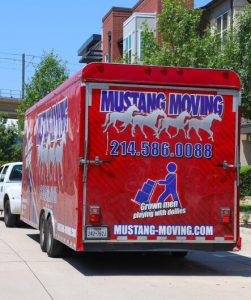How Much to Hire Movers: A Breakdown of Costs and Services
Get Your Free Moving Estimate
Moving to a new home is an exciting milestone, but it can also be overwhelming, especially when it comes to managing the costs. Understanding how much to hire movers can be a critical factor in planning your move. Whether you’re relocating to a new neighborhood or across the country, knowing what to expect when it comes to moving costs can help you plan better and avoid any surprises. In this post, we’ll break down the different factors that affect moving costs, so you can make an informed decision when selecting professional packers and movers for your big day.

How Much Does It Cost to Hire Movers?
The answer to the question “How much do moving companies charge” varies depending on several factors. On average, the cost to hire movers can range from $80 to $400 per hour for local moves. However, the total cost will depend on how far you’re moving, the size of your home, and what services you need.
For local moves, companies typically charge by the hour, with rates starting around $80/hour for two movers. Additional movers or extra services, such as packing and assembly, can raise the total cost. For longer distances, prices usually depend on the weight of your belongings and the distance between your current and new home. Long-distance moves often cost between $2,000 to $5,000 or more.
Factors That Affect Moving Costs
Several key factors influence the overall cost of hiring a moving company. Here are the main variables that determine what you’ll pay:
1. Distance of the Move
Local moves typically have a lower cost compared to long-distance moves. For local moves, pricing is usually based on an hourly rate, while long-distance moves tend to be priced based on the weight of your items and how far they need to travel.
Long-distance moves can be expensive, often ranging from $2,000 to $5,000 for a typical 2-3 bedroom home. This includes fuel costs, the time spent on the road, and any overnight stays if necessary.

2. Size of Your Home and Belongings
The size of your home and the amount of stuff you have is another factor that affects moving costs. For example, moving a one-bedroom apartment is typically cheaper than moving a four-bedroom house due to the volume of furniture and boxes involved. Companies may charge based on the time it takes to load, transport, and unload your belongings or by the weight of the items.
3. Time of Year
Moving costs can fluctuate depending on the time of year. The busiest times for moving are during the summer months, weekends, and the first and last days of the month. If you have flexibility in your moving date, scheduling during off-peak times, such as mid-week or winter months, can help lower costs due to decreased demand.
4. Additional Services
If you require additional services, such as packing, disassembling furniture, or special handling for fragile items, these will add to the cost of the move. Some moving companies also charge for materials like boxes, tape, and bubble wrap. Be sure to ask for a breakdown of any extra charges during the estimation process.
Hourly Rates vs. Flat Fees
Understanding the pricing structure of your movers is important to ensure you’re getting a fair deal. Moving companies typically offer two types of pricing: hourly rates and flat fees. Each comes with its advantages, depending on your move.
Hourly Rates
For local moves, hourly rates are common. The typical cost for a two-person moving crew is $80 to $200 per hour, though rates may increase based on the size of the move and the number of movers required. Hourly rates cover the time movers spend loading, transporting, and unloading your items. Some companies require a minimum number of hours (often 2-3), so be sure to check the specifics when booking.
Hourly rates are ideal for smaller moves or short distances, as they allow you to only pay for the actual time spent on the move. However, it’s important to keep in mind that if the move takes longer than expected, your final bill could be higher than anticipated.

Flat Fees
Flat fees are generally offered for long-distance moves. Instead of being charged by the hour, you’re given a fixed price based on the distance and weight of your belongings. Flat fees provide clarity and eliminate the possibility of surprise charges.
For example, if you’re moving from Colorado to Texas, a flat-rate moving company will calculate the total cost based on the weight of your items and the distance they will travel. This pricing structure can help you budget more effectively, especially for long-distance moves.
Typical Moving Costs Based on Scenario
Let’s break down typical moving costs for various types of moves, based on size and distance, to give you an idea of what to expect.
1. Local Move (1-2 Bedroom Apartment): For moves within a 50-mile radius, expect to pay between $300 and $1,500. The cost will depend on how much furniture you have, the time it takes, and any extra services requested (e.g., packing, moving large items).
2. Local Move (3-4 Bedroom House): A larger move within a city or nearby suburb may cost between $1,000 and $3,000. Larger homes mean more time and resources needed for the move.
3. Long-Distance Move (Cross-Country Move): A move across states or cross-country can cost between $2,000 to $5,000 or more. The cost will be calculated based on the weight of your belongings, the distance, and any additional services like packing or storage.
4. Hourly Rate (Local Move): Generally, moving companies charge $80 to $100 per hour for two movers. Adding a third or fourth mover will increase the hourly rate.
Why Hire Professional Movers?
While some people may consider handling the move on their own, hiring professional movers offers several advantages that can make the process smoother and safer.
Efficiency and Expertise
Professional movers are skilled at handling moves of all sizes. They know the best packing methods to prevent damage to your items and have the right equipment to move heavy furniture efficiently. This can significantly reduce the time and stress involved.

Insurance and Protection
Most moving companies offer insurance options, which provide coverage in case your items are damaged during the move. This added protection can save you from costly repairs or replacement expenses.
Cost-Saving in the Long Run
Although hiring movers may seem expensive, it can actually save you money in the long run. By avoiding damage to your belongings and reducing the chances of injury while moving heavy items, you can minimize potential costs associated with doing the move yourself.
Mustang Moving: Affordable and Effective Moving Services
When it comes to moving, you deserve a company that combines both quality and affordability. Mustang Moving offers professional moving services designed to meet the unique needs of every customer, whether you’re moving within Dallas / Fort Worth or to any other state from Texas.
At Mustang Moving, we pride ourselves on offering affordable rates without sacrificing quality. Our experienced movers are equipped to handle moves of all sizes, ensuring that your belongings are transported safely and efficiently. We also offer a free, no-obligation quote to help you plan your move with confidence.
Get a free quote for your move today or Contact us to learn more about how our affordable services can make your move stress-free!

Conclusion
Knowing how much to hire movers for your upcoming move is crucial to planning your budget and ensuring a smooth process. Whether you’re moving locally or long-distance, understanding the variables that influence moving costs will help you make an informed decision. If you’re looking for a reliable, affordable moving company, Mustang Moving has you covered. Contact us today for a free quote and make your move easy and cost-effective!
FAQs
Do moving companies provide packing services?
Yes, many companies offer packing services, but these come at an additional cost. It’s a good idea to discuss this with your movers during the estimate process.
How can I reduce the cost of my move?
To save on costs, consider packing yourself, moving during the off-season, or downsizing your belongings before the move.
Should I book movers in advance?
It’s recommended to book your movers at least 4-6 weeks in advance, especially during busy moving seasons.
Do movers charge extra for stairs or elevators?
Many moving companies charge an additional fee if your new or old home has stairs or requires elevator use. This is typically a “stair carry” or “elevator fee” and is often added to the overall cost.
What happens if my belongings are damaged during the move?
Most moving companies offer insurance options to cover potential damage. There are typically two types of insurance: basic coverage (which is often included) and full-value protection (which requires additional fees). Be sure to understand your options and coverage limits before the move.
